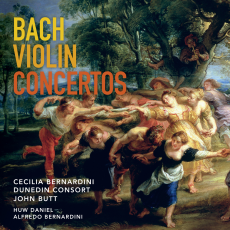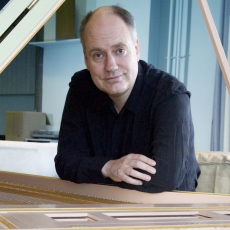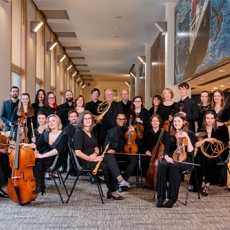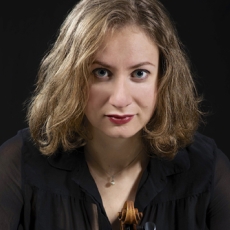Dunedin Consort - J.S. Bach: Violin Concertos - The Herald Scotland
The rebel's road to baroque Bach
TEENAGE rebellions are, by their nature, contextual. For the kid growing up in an orthodox religious family it might be drink or sex. For the child of liberal lefties it's a career in hedge funds, possibly golf. For Cecilia Bernardini, daughter of early music royalty, teenage rebellion was playing the Tchaikovsky Violin Concerto with an awful lot of vibrato. "My parents just about endured it," she cringes.
Bernardini is the Dutch-Italian leader of the Dunedin Consort - Scotland's early music ensemble - and soloist on a superb new Dunedin recording of Bach's violin concertos released last week on Linn Records. Her playing is warm and original, lightly virtuosity and deeply musical, healthily eccentric. She digs into her fiddle with an earthy, organic sort of lyricism and a playful conversational spark that has bags of charisma but never sounds forced. In short, she has the sound of a natural.
Bernardini's mother is a baroque orchestral violinist and her father, Alfredo, is an esteemed baroque oboist who moved from Italy to the Netherlands in the 1980s to position himself at the epicentre of the early music movement. "I do have an uncle who is a modern composer and works with electronic music and things..." Bernardini reveals. "He's kind of the black sheep of the family. I suppose we all go through our rebellious moments."
When Bernardini took up the violin she learned on a regular modern instrument. Her first teacher gave her a cassette tape every week featuring a different romantic concerto played by a different romantic-style soloist. "I must have listened a hundred times to Nathan Milstein playing the Tchaikovsky concerto," she smiles. "Until the tape wore out. I thought he was the ultimate. I remember deciding that if I learned a bar of that concerto every day then in two years I would be able to play the whole thing really well."
She studied at the Conservatory in Amsterdam where her peers were equally fanatical about shiny playing and spurred each other on to bigger, faster, louder flights of virtuosity. "We were competitive in a good way," she remembers. "It's probably where my work ethic came from." But the institution still held fairly unreconstructed attitudes towards early music, with a general impression that you only become a baroque violinist if you fail as a modern violinist. "Even my last teacher in Amsterdam - an incredible Russian virtuoso who taught me so much - always advised me to wait with the baroque stuff. "'You can always do it later if you have to,' he would tell me."
And maybe it was inevitable that she always would do it. "My father thinks I was born to play baroque violin," she sighs. "I guess because I heard this music so much in my youth, and always played by the very best musicians." Giants of the early music world, from harpsichordist Ton Koopman to viol player Jordi Savall, were regular guests around the Bernardini kitchen table. "And actually," Bernardini adds a little shyly, "my dad is one of the very greatest musicians I know. I probably learned most of all from him. In any case, I got all this music before I got anything else, so it's engrained in my DNA."
Her professional debut as a baroque player happened almost by accident. She was 21 and hadn't yet officially declared herself an early music specialist; she had a baroque violin at home and had "toyed with it a bit," she says. Her father was recording a disc of Mozart serenades for Sony Classics with his period-instrument ensemble Zefiro, and at the last minute his first violinist pulled out. "I still don't know how he had the courage to ask me to be the replacement," Bernardini admits. "It could have been a complete disaster. At the beginning I felt incredibly self-conscious. I mean, all his colleagues had known me since I was literally a baby, so to suddenly take the lead was about as daunting as it gets. But sometimes the less time you have to worry about something the better. I think it went alright..."
It must have done, because a decade later Bernardini is one of the brightest baroque violinists of her generation. She's keen to point out that she still plays modern violin - she frequently leads an orchestra in Paris called Pygmalion and has a string trio called Serafino that plays post-baroque repertoire on modern instruments, albeit strung with gut. Scottish audiences might remember that she was on trial to be leader of the Scottish Chamber Orchestra for several years, but eventually withdrew from the running because her baroque engagements were ramping up. She wants to keep her options open, she says, "but the reality is that with my surname, and the fact there's another Dunedin CD on the way, people will get to know me as a baroque violinist." She's retaining her right to rebellion, but she's also grudgingly accepting her home territory.
And she is right that her new recording will lodge her musical personality in the imagination of listeners: that husky tone, that rhythmic swing, that habit of tugging at the corner of phrases and that ability to dart in and out of ensemble textures and make the whole thing sound so joyously convivial. I remember sitting in on the recording session toward the end of 2014 and noticing how Bernardini didn't position herself out in front of the group, where most concerto soloists would, but in amongst the other players. "Of course!" she replies. "The Dunedin Consort consists of soloists of their own right - players like Jonathan [Manson], Huw [Daniel], Alfonso [Leal del Ojo]... So I never find there's a need to impose or stand out. The disc might be marketed as a concerto collection, but I really see it as a chamber project."
In the Concerto for Violin and Oboe in C minor, Bernardini is joined by her father. The two have been collaborating more and more in recent years - "and we enjoy it a lot!" she smiles. "The only struggle was back when we started playing together on an equal level. It was hard to not feel like..." she pauses to find the right words. "Well, the nature of our relationship has always been him teaching me things. Of course he has a vast amount of knowledge and experience, but at some point I needed to make a switch and be able to take my own space on the stage. It happened gradually and it's a mutual thing. Not just how much I take that space, but how much he gives it to me. I think we've now found a nice balance."



